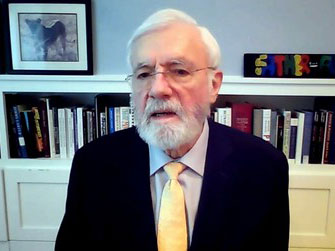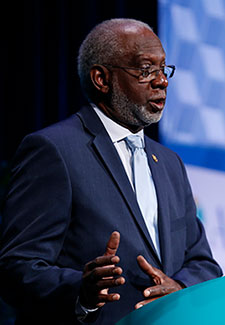For the nearly two years of the COVID-19 pandemic, public health workers have been determined, overworked, frustrated, harassed and applauded. The new scrutiny has resulted in both more funding for the field and more attention to its work and role in our lives. But what should our society do now — and post-pandemic — with that awareness?
That was the question for the panelists during Monday’s General Session, “State of Public Health: Where Do We Go Next?”
 Before the robust panel discussion, William Foege gave a keynote address focusing on the success and wonder of vaccines throughout history. Foege is the former director of the Centers for Disease Control and Prevention, an APHA past president and an epidemiologist who worked on the successful campaign to eradicate smallpox in the 1970s.
Before the robust panel discussion, William Foege gave a keynote address focusing on the success and wonder of vaccines throughout history. Foege is the former director of the Centers for Disease Control and Prevention, an APHA past president and an epidemiologist who worked on the successful campaign to eradicate smallpox in the 1970s.
Modern public health can be traced back to 1796, Foege said, when Edward Jenner created the first-ever vaccine, which protected against smallpox.
Next up, in the 1930s, Pearl Kendrick was one of the developers of the first successful pertussis vaccine. Known as whooping cough, the disease regularly killed thousands of children each year. Foege said that in Kendrick’s eulogy it was pointed out that the public didn’t really know Kendrick saved hundreds of thousands of lives. And Kendrick didn’t know the names of the people she protected. But, she was secure in the knowledge of what she had done.
“I hope all of you in public health are secure in the knowledge of what you are doing,” Foege told the audience. “It’s a profession that does not reward you financially, and it usually does not even thank you. But if you can be secure in the knowledge of what you are doing, that is important.”
More and more vaccines continued to be created, saving countless lives across the globe. Then, SARS-CoV-2 appeared. “Now we have a virus that we all fear, and yet it cannot stand up to the science of vaccines,” Foege said. “We have a vaccine that is not only good, but it’s actually spectacular.”
However, so many politicians and citizens are downplaying and refusing the vaccine, spreading lies and conspiracy theories. Foege said the public health field needs to go back and work on three basic foundations:
- Science: Get the science right and present it as common sense.
- Art: Art is connected to creativity, so combine science and art to achieve creative common sense.
- Remember science has no moral compass, so we have to provide scientists with one.
Following Foege, panelists agreed that to improve the public health field, three areas deserve focus: workforce, infrastructure and training.
“We came into this pandemic with a frail national public health system, and we need to be in a better place after this pandemic than we were when it started,” said current CDC Director Rochelle Walensky.
 The U.S. needs to invest in growing a skilled, diverse public health workforce; modernizing data and computer systems; and improving laboratory capacity, she said.
The U.S. needs to invest in growing a skilled, diverse public health workforce; modernizing data and computer systems; and improving laboratory capacity, she said.
Or, as panelist Nirav Shah put it: “Many health departments, including mine, are single-handedly keeping the fax industry alive in the United States. That’s not a good thing.” Shah is director of the Maine Center for Disease Control and Prevention and president of the Association of State and Territorial Health Officials.
But even as funding increased during the pandemic, it often came with too many restrictions, panelists said. Money is often geared toward one disease or one issue and can’t be moved to address another problem. In one example, Walensky was told public health workers weren’t allowed to use the “sickle cell fax machine” to send HIV case reports.
“That’s absurd,” she said. She acknowledged that such situations are “really frustrating on our end and I know at the state level, jurisdictional level, county level, city level as well.” Instead, funding needs to be disease agnostic and longitudinal, she said.
 Shah pointed out another cumbersome restriction is funding timelines. “We do now have high degrees of funding …[but] that funding often has a clock associated with it. …Right now, the concern that many folks have articulated is that we’ve got so much funding, and so much pressure to spend it quickly, if we spend it improperly, we weaken the case for having that funding sustainable over the long term.”
Shah pointed out another cumbersome restriction is funding timelines. “We do now have high degrees of funding …[but] that funding often has a clock associated with it. …Right now, the concern that many folks have articulated is that we’ve got so much funding, and so much pressure to spend it quickly, if we spend it improperly, we weaken the case for having that funding sustainable over the long term.”
Instead, imagine if public health was treated like the Pentagon. “Throughout the pandemic, we’ve characterized it and used military metaphors…but what if we actually funded public health the way that we fund our military?” Shah asked. That would mean adequate, sustained, protected funding.
Nadine Gracia, president and CEO of Trust for America’s Health, said, “One of the things I would love to see us be able to do in preparing for that next health threat…is saying we learned the lessons of the COVID-19 pandemic and we actually acted on them, that our nation heard and that our policymakers enacted what we know are evidence-based recommendations to strengthen our nation’s public health system at all levels.”
Also during the session, former U.S. Surgeon General and CDC Director David Satcher received the 2021 Fries Prize for Improving Health. Satcher, founder of the Satcher Health Leadership Institute, was honored for his outstanding achievements and lifetime commitment to eliminating health disparities and championing health equity for all.
Photos, from top, of William Foege, Rochelle Walensky and Nirav Shah speaking during the Monday General Session, by Michele Late/courtesy The Nation's Health. Photo of David Satcher by Jim Ezell/EZ Event Photography